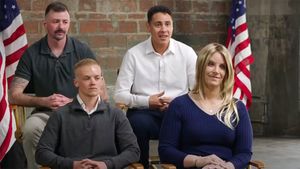
Treatment GuideJust DiagnosedSex & DatingAfrican AmericanStigmaAsk the HIV DocPrEP En EspañolNewsVoicesPrint IssueVideoOut 100
CONTACTCAREER OPPORTUNITIESADVERTISE WITH USPRIVACY POLICYPRIVACY PREFERENCESTERMS OF USELEGAL NOTICE
© 2025 Pride Publishing Inc.
All Rights reserved
All Rights reserved
Scroll To Top
By continuing to use our site, you agree to our Private Policy and Terms of Use.
Ronald Mitsuyasu, MD, has a big problem. 'Enrollments for our antiviral treatment programs are down nearly 60%!' he says with frustration in his voice. 'Recruiting people for our other studies, including lipodystrophy and vaccine trials, is proving to be just as problematic.' He has good reason to be concerned. Mitsuyasu is the director of the University of California, Los Angeles, Center for Clinical AIDS Research and Education'a wellestablished clinical trials site. He says there is a crisis facing researchers today as they race to find new treatments for people living with HIV disease. 'We are in jeopardy of losing several research projects because we cannot maintain the required number of enrollees,' he says. 'And the problem isn't confined to Los Angeles'it is nationwide, according to many of my associates in other cities.' Echoing Mitsuyasu's concerns is Claudia Quittner, who heads the research efforts for the University of Texas Southwestern Medical Center at Dallas. Quittner has been trying to enroll people in a study dealing with physical and metabolic abnormalities relating to lipodystrophy. She suggests that the changing demographics of HIV and current treatment options have had a negative effect on recruitment. 'In 1996, for example,' she says, 'recruiting 20 to 25 people for a clinical trial was not a problem and could usually be accomplished within six to eight months. Today, however, that would be impossible.' At Pacific Oaks Medical Group in Beverly Hills, Gary R. Cohan, MD'who writes the Clinic column for HIV Plus'reports similar concerns among the researchers who work with him. 'There is a complacency on the part of the patient population,' says Cohan, who is the managing director at Pacific Oaks. 'There's not the same altruistic spirit of 'Whatever I can do to help the cause' that there was five or 10 years ago.' He suggests that the steep decline in enrollment for research studies can be attributed to several factors, including the current arsenal of anti-HIV medications'which allows most patients to get prescriptions for an effective treatment regimen without, as he puts it, 'having to jump through hoops''as well as patients' perceptions about what is an inconvenience in a clinical study. The crisis confronting AIDS researchers is indeed serious. Without enrollees for their clinical trials, new anti-HIV therapies and medications for related opportunistic infections will likely be delayed for years before making it to the market. As is mandated by the federal Food and Drug Administration, new drugs must pass through a series of phases before they can be made available to the public. The speed with which new drugs are made available depends in large part on the number of people enrolled in a clinical trial. 'We are seeing research studies take twice as long as they need to,' Mitsuyasu says, 'because people just aren't enrolling. It wasn't always like this, you know.' Which leads one to ask, Why aren't clinical trials as attractive as they used to be? Indeed, there was a time when activist groups protested in the streets and held sit-ins in order to get the federal government to change its rules on evaluating drugs so that patients could receive anti-HIV medications through fast-track programs. Trent, a 30-something Chicago executive living with an undetectable viral load, offers his insight. 'I have been living with HIV since 1995,' he says, 'and decided to do my part to help by enrolling in a few clinical trials. At first it was kind of exciting, but after a while I got turned off big-time. Most of them require too much of a time commitment'you know, like weekly visits to a clinic. When I wasn't working, this wasn't a problem. But now that many of us are starting to put our lives back together by entering the workforce once again, it's a huge issue. To take out two or three hours a week for a research study'plus work and family obligations'just isn't a reality.' After a slight pause, Trent almost seems to catch a second wind as he remembers even more details that made him decide that being a volunteer was not for him. 'Then there is all of that paperwork involved!' he adds. 'Getting multiple 'permission slips' from your doctor to get into the program. That all takes a tremendous amount of time. And the commute! Have you ever tried to drive at 5 p.m. in downtown Chicago? It can take one hour to move three miles. When you work all day, who wants to sit in traffic in order to make it to a volunteer study'especially when you are doing just fine on your meds?' Trent explains that the final straw for him was the experience of getting 'burned' during his last stint as a volunteer. The trial, for a neuropathy drug, was canceled at the six-month point because its funding ended. 'Mind you, this was after they took a biopsy from my leg, which was a requirement in order to be enrolled,' he says. 'All the time I spent commuting to the trial site, plus the weekly hospital visits'it all went up in smoke for nada.' Trent's feelings echo those of others. Consider the experience of Nick, a 28-year-old HIV-negative commercial sex worker: 'There was a trial that was going on not too long ago for an AIDS vaccine. They wanted me to go in once a week for almost two hours a day over a three-year period. What did they offer me? A puny $25 per visit!' He chuckles and then adds, 'I dropped out after a week. It just wasn't worth my time. I can make five times more turning a trick online and use a rubber as my 'vaccine.' They make the damn things too complicated anyway.' Mitsuyasu has heard the same kinds of comments from his patients. 'There are many valid reasons for why a person declines to enroll in a clinical trial, which definitely include issues surrounding time commitments and enrollee incentives,' he says. 'That said, though, I can't help but remember the days when getting into a drug-research study meant having to be placed on a waiting list. Those days have evaporated, however.' Mitsuyasu offers possible clues relating to the current crisis: 'There are 16 FDA-approved antiviral medications available to people living with HIV disease'which is a good thing'because they are prolonging lives. The bad part, however, is that individuals have lost interest in new drug therapies because they are doing so well on these meds. This has caused a collective disinterest in clinical trials. There is no longer a perceived threat to their health. I have an [interleukin-2] study going on right now and have found little interest in it. It is very frustrating.' How, then, can researchers realize an increase in the number of enrollees for their studies? Mitsuyasu suggests that people involved in clinical trials need to offer feedback to the principal investigator so that problems can then be communicated to the drug companies sponsoring the trials. 'We need to hear back from participants about what is keeping them from enrolling in, or staying committed to, a research study,' he says. 'If people want shorter commitment times or less involvement with a study, it is important that they tell us. We can then go back to the pharmaceutical companies and make an argument for simplification. If higher incentives are the concern, we need to know about that too. All of it is relevant.' In the end, though, Cohan says, there is another important element that can keep volunteers from lining up to sign up as they did in days of old. 'Many clinical trials are drug company'authored,' he says, 'and the randomization process as well as the drugs used in the comparator arms may not be in the medical best interests of the patient.' And this reason for lack of enrollment is not something that can easily be changed by trying to persuade people that by becoming volunteers they are looking out not only for their own best interests but everyone else's as well. 'Patients need to understand that the only way to get new treatments'especially when their old ones have failed,' Mitsuyasu says, 'is to have a drug pass through a clinical trial. We have the chance to introduce new drugs and possibly save lives'but only if we can get people to join these studies.'
From our Sponsors
Most Popular
Lexi Love comes out as HIV+ after Trump deletes federal resources
January 23 2025 11:23 AM
Ricky Martin delivers showstopping performance for 2024 World AIDS Day
December 05 2024 12:08 PM
Trump's orders prompt CDC to erase HIV resources
January 31 2025 5:29 PM
This long-term HIV survivor says testosterone therapy helped save his life.
December 16 2024 8:00 PM
California confirms first case of even more deadly mpox strain
November 18 2024 3:02 PM
Plus: Featured Video
Latest Stories
Grindr is reminding us why jockstraps are so sexy and iconic
May 02 2025 5:36 PM
Broadway's best raise over $1 million for LGBTQ+ and HIV causes
April 03 2025 7:15 PM
Season 4 of The Switch on resilience & radical self-love returns this spring
March 26 2025 12:20 PM
BREAKING NEWS: Trump admin moves to end federal HIV prevention programs
March 18 2025 6:10 PM
A camp for HIV-positive kids is for sale. Here's why its founder is celebrating
January 02 2025 12:21 PM
Decades of progress, uniting to fight HIV/AIDS
December 01 2024 12:30 PM
Climate change is disrupting access to HIV treatment
November 25 2024 11:05 AM
HRC holds 'die-in' to protest Trump health care cuts
April 28 2025 2:11 PM
Two right-wing Supreme Court justices signal they may uphold access to PrEP and more
April 21 2025 4:10 PM
The Talk Season 5 premieres this spring with HIV guidance for the newly diagnosed
March 26 2025 1:00 PM
Jess King is here to help you live your happiest, healthiest life yet
March 24 2025 4:35 PM
Gerald Garth is keeping people of color happy and healthy through trying times
March 11 2025 3:38 PM
Tyler TerMeer vows to continue to fight for health care for all
January 28 2025 3:00 PM
'RuPaul's Drag Race' star Trinity K Bonet quietly comes out trans
December 15 2024 6:27 PM
500,000 Children at Risk: PEPFAR Funding Crisis
April 08 2025 3:51 PM
Discover the power of Wellness in your life
March 26 2025 12:41 PM
Celebrating Black History Month with our annual African American issue
February 01 2025 3:28 PM
Plus nominated for 2025 GLAAD Media Award
January 22 2025 12:42 PM
AIDS Memorial Quilt displayed at White House for the first time
December 02 2024 1:21 PM
Hollywood must do better on HIV representation
December 01 2024 9:00 AM











































































